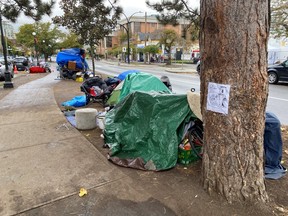Josh Dehaas: Firefighter shouldn’t be punished for talking about homeless violence
A Victoria father asked his premier to keep a homeless hub from opening in his neighbourhood — only to be reprimanded at work
Josh Dehaas, Special to National Post
(National Post, Aug 26, 2024)
175 Comments

Article content
In July, Victoria firefighter Josh Montgomery wrote a letter to British Columbia Premier David Eby, imploring him to stop the city from relocating a homeless hub where people are expected to use drugs to a new space next to a senior’s residence — and only steps from his own home, where his young daughters play outside.
He drafted the letter after 60 homeless people swarmed local first responders as they tried to help a paramedic who’d been assaulted by a patient, frightening them so badly that they now refuse to go into that part of the city without police escorts. For speaking up, Montgomery was suspended for a day without pay.
There is strong legal precedent to suggest this violated Montgomery’s expression rights.
Many people believe that public sector employees leave their right to free speech at the door. That’s not correct. Although public sector employees must remain non-partisan, and, like all employees, have a “duty of loyalty” to their employers that prevents them from disparaging their organization, they aren’t required to keep their lips sealed.
In the 1985 Supreme Court of Canada decision of Fraser v. Public Service Staff Relations Board, Chief Justice Brian Dickson wrote that public employers must balance an employee’s duty of loyalty against his or her right to free expression. Our democratic system, he reasoned, is “deeply rooted in, and thrives on, free and robust public discussion of public issues” and as such, “all members of society should be permitted, indeed encouraged, to participate in that discussion.”
Dickson recognized that because so many people work for the public sector, we can’t have the robust public debates needed to self-govern unless public employees can also speak up in certain circumstances.
.
He explained that although public servants cannot engage in “sustained and highly visible attacks on major Government policies,” public employees can still “actively and publicly express opposition to the policies of governments.” This is especially true when those policies jeopardize the “life, health or safety of the public servant or others, or if the public servant’s criticism had no impact on his or her ability to perform effectively the duties of a public servant or the public perception of that ability.”
In the case of senior federal public servant Neil Fraser, the court decided he could not repeatedly compare Pierre Trudeau’s government to the Nazi regime.
Dickson offered a number of examples of speech that public employees may engage in without violating their duty of loyalty. A city bus driver may attend a town council meeting to protest a zoning decision. A provincial clerk may join a weekend protest against the provincial government’s decision to cut funding from a daycare centre or women’s shelter. A federal commissioner may speak at a Legion meeting about a lack of support for veterans.
Dickson also gave an example of speech that would cross the line. Although a low-level government clerk could not be fired for protesting provincial daycare policies, a deputy minister could be fired for speaking “vigorously against the same policies at the same rally.” In other words, the balance may tip in favour of the public employer if the employee is more senior.
The Alberta Court of Appeal applied the Supreme Court’s guidance in Fraser to overturn the reprimand of a social services employee who sent a letter that was critical of provincial policy to a member of the opposition. The British Columbia Court of Appeal considered Fraser when overturning school board directives prohibiting teachers from discussing political issues such as class sizes during parent-teacher interviews.
Surely a firefighter wary of the dangers that come with moving hundreds of homeless and often drug-addicted people into a residential neighbourhood has a right to express his public safety concerns — without being suspended and losing a day’s pay.
